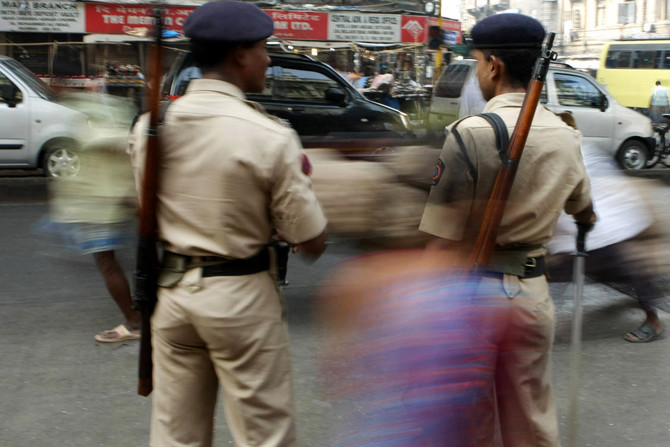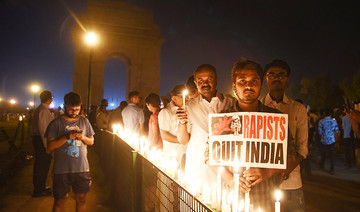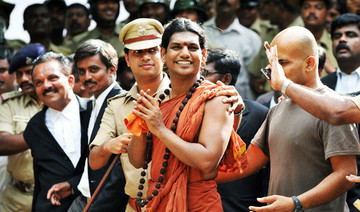MUMBAI: Eleven members of a family were found dead in India’s capital on Sunday, most of them hanging from the ceiling of their home, blindfolded and hands tied behind the back, in a part of the city that was the scene of a gang war just two weeks ago.
The victims included four men and seven women, including teenagers. A neighbor in the Burari district found the victims early on Sunday, police said.
One of the bodies was found lying on the floor and the others hanging from a railing attached to the ceiling, media reports said.
“We don’t know the reason yet, our team is at the spot and investigating this,” said a police official posted in the area, who did not give further details. The official cannot be identified under briefing rules.
On June 18, three people were killed and five were injured when members of rival gangs fired at each other in the main Burari market. Police said the two gangs are headed by men whose enmity goes back to 2013.
While police are yet to establish any connection between the two incidents, the investigation will consider all possible aspects, a senior police officer who is handling the gang war case told Reuters.
Eleven people killed in India’s capital, police probe link to gang war
Eleven people killed in India’s capital, police probe link to gang war

Riyadh hosts high-level talks with former world leaders to address global issues

- Theme of the talks is “The Middle East in a Changing World: uncertainties, risks, and opportunities”
- Topics at the meeting will build on and further develop the actions decided at the sustainable development goals summit in September 2023 as well as COP28
RIYADH: Two days of talks in Riyadh are focused on several issues, including the world order, its challenges and opportunities, the regional politics of the Middle East, such as the Israeli-Palestinian conflict, and challenges of maritime security.
The talks, from May 19-20, are being hosted by the King Faisal Center for Research and Islamic Studies in partnership with Nizami Ganjavi International Center and the United Nations Alliance of Civilizations. The theme of the talks is “The Middle East in a Changing World: uncertainties, risks, and opportunities.”
“By having these kinds of sessions, we develop our own thinking,” Ismail Serageldin, co-chair of Nizami Ganjavi International Center, told Arab News.
“You hear one point of view and the counterpoint of view, and you weigh all of that, and these are all very influential people. They were all former presidents and prime ministers, and they had influence on their delegations of the countries there. And they may be able to mediate between different opinions when we have a more formal proposal coming up later,” he said.
Other topics of discussion include the urgency of global dialogue, climate change, economies in the Middle East, and the Middle East in the age of artificial intelligence.
“We hope to gather these insights for the summit of the future in the United Nations in September and then again in the COP29, in Baku in November,” Serageldin said.
Topics at the meeting will build on and further develop the actions decided at the sustainable development goals in September 2023 as well as the COP28 meeting in Dubai in December 2023.
Chairing the panel as keynote speakers were Prince Turki Al-Faisal, chairman of the King Faisal Center for Research and Islamic Studies, and Vaira Vike-Freiberga, co-chair of Nizami Ganjavi International Center and former president of Latvia.
Also attending were Deputy Minister of Foreign Affairs Waleed El-Khereiji, Miguel Angel Moratinos, the high representative for the UN Alliance of Civilizations, and Maria Fernanda Espinosa, president of the 73rd session of the UN General Assembly and former minister of foreign affairs and minister of defense of Ecuador.
Other participants on the panel included Ivo Josipovic, the former president of Croatia, Mladen Ivanic, former president of Bosnia and Herzegovina, Stefan Lofven, former prime minister of Sweden, Rosen Plevneliev, former president of Bulgaria, and Montenegro’s former minister of defense, Milica Pejanovic.
Discussing the list of high-level officials on the panel Serageldin said: “Many of them are former presidents, former prime ministers, who have had enormous international and national and regional experience. We want to develop insights in a framework that allows us to discuss, without the formality of official delegations presenting proposals and reacting to the proposals of another country. Global challenges require global responses.
“The first session discussed the new global order, not just how to deal with the problems of the Middle East,” Serageldin said.
Another speaker at the session, Volkan Bozkir, president of the 75th session of the UN General Assembly and former minister of EU affairs for Turkiye, said: “We must not only concentrate on Russia and Ukraine issues.
“There are horrible things happening in other parts of the world, like Sudan, there is famine, people are dying there, we must show our coordination to help those countries, there is a fight in the Latin American countries, drug lords are capturing societies,” Bozkir said.
He emphasized the need to go beyond the Russia-Ukraine conflict and jointly tackle other challenges around the world.
Plevneliev discussed the crises in Gaza and put a question to the meeting: “What happens on the day after in Gaza?”
He highlighted the importance of having a strategy for the future of Gaza, underlining the need for “sustainable solutions for peace.”
Shoura council member Huda bint Abdulrahman Al-Halisi discussed multilateralism and the need to bridge local and global.
“If we all agree that multilateralism is in crisis, we need to discover the root causes and the possible solutions,” she said. “We all agree that all countries have or should have an equal voice.
“We all want justice, we want development, we want peace, but we are not achieving this globally because there is a weakening of democracy around the world, we see that it is only right that we hold governments into account for not keeping to their commitments,” Al-Halisi said.
She called for the need to push for transparency and accountability, the rule of law, responsiveness, and inclusivity.
“We need to bridge the local with the global,” she said.
In an interview with Arab News, Serageldin emphasized the need to turn back to the UN.
“It was rightly said that the UN is the only institution that has global legitimacy. Everywhere in the world somebody recognizes the UN, but we all recognize that it is hampered, it is tied up, it can’t function,” he said.
“We need to find ways of reviving it (UN) and giving it the hope that we all have to bring to the task of global peace and security,” he said.
Jeddah university hosts forum on technology, creativity

- Conference explored best practices in technology and interdisciplinary scientific research
JEDDAH: Dar Al-Hekma University in Jeddah recently wrapped up its third “Creativity, Technology, and Sustainability” conference, sponsored by the Ministry of Communications and Information Technology.
The two-day event, held on May 15-16, drew a wide range of experts, scholars and local and international officials to explore interconnected themes in pursuit of Saudi Arabia’s Vision 2030 and the UN Sustainable Development Goals.
Dr. Abeer Al-Dughaither, the university’s president, highlighted the significance of the conference, saying: “This event embodies the values of the university, which aims to anticipate scientific and practical futures and stay abreast of developments to be an active partner in various aspects of development. There is no doubt that the three pillars of the conference (creativity, technology, and sustainability) represent a fundamental pillar in any cultural renaissance.
“This conference reflects the university’s strategic plan to build bridges of scientific and cultural cooperation between it and local and international institutions, with knowledge and cultural experts participating from within the Kingdom and abroad at the regional and global levels,” she added.
The conference explored best practices in technology and interdisciplinary scientific research, underlining how these advancements foster creativity and development to tackle global challenges.
Discussions also covered the critical role of advanced technology in sustainable development and digital transformation, alongside the significance of effective management, policies and ethics in attaining sustainability objectives.
During his keynote speech on “Innovative Key Facilities for Human-Centered and Sustainable Design,” Prof. Luigi Maffei from the University of Campania Luigi Vanvitelli in Caserta, Italy, emphasized the changing viewpoints within disciplines exploring environmental changes and their effects on individuals.
He said: “Many disciplines are transitioning from a negative, monodisciplinary approach to a positive, multidisciplinary one that is more human-centered and sustainable, recognizing the importance of considering the well-being of individuals in design solutions.”
Ahmed Elmasry, professor of corporate finance and governance at the Centre for Financial and Corporate Integrity, Coventry University, UK, delivered a thought-provoking speech on environmental, social and governance controversies.
He highlighted the importance of leading change and inspiring growth to empower tomorrow by harnessing technology, sustainability and innovation as drivers for business evolution.
In his speech on “Cognitive Cities and the Future of Urban Living,” Joaquim Alvarez, head of cognitive technologies at the engineering technical services department at NEOM, said: “Understanding the evolution of urban areas by examining cities’ development trajectory is crucial. Transitioning from historical reflections to dynamic adaptation for contemporary challenges is imperative.”
Speakers at the conference outlined the significance of education in promoting awareness about sustainability. Panel discussions, moderated by a diverse group of experts, academics, and officials from local and international backgrounds, explored the interconnected themes of creativity, technology and sustainability.
The sessions delved into research topics that deepen our understanding of technological progress, fostering innovation and progress.
The conference offered a range of workshops to nurture creativity and cultivate essential skills crucial for sustainable development.
A dedicated section featured scientific papers and posters from researchers, with several contributions by students from Dar Al-Hekma University.
Closing Bell: Saudi main index edges down to close at 12,198

RIYADH: Saudi Arabia’s Tadawul All Share Index slipped on Sunday losing 0.06 points to close at 12,198.38.
The total trading turnover of the benchmark index was SR4.42 billion ($1.18 billion) as 60 stocks advanced, while 160 retreated.
On the other hand, Nomu, the parallel market, rose 577.98 points, or 2.18 percent, to close at 27,062.01. This comes as 28 stocks advanced while as many as 33 retreated.
Meanwhile, the MSCI Tadawul Index slipped 1.45 points, or 0.09 percent, to close at 1,528.60.
The best-performing stock of the day was Lazurde Co. for Jewelry. The company’s share price surged 10.00 percent to SR16.06.
Other top performers included Middle East Specialized Cables Co. as well as Aldrees Petroleum and Transport Services Co.
The worst performer was Zahrat Al Waha for Trading Co., whose share price dropped by 10 percent to SR45.45.
Makkah Construction and Development Co. as well as Jazan Development and Investment Co also performed poorly.
On the announcements front, Kingdom Holding Co. announced its interim financial results for the period ending March 31.
According to a Tadawul statement, the company’s net profit hit SR196 million in the first quarter of 2024, reflecting a 14.6 percent surge when compared to the similar quarter last year.
The increase is mainly due to a rise in the sale of investment property, a surge in the share of results from equity-accounted investees, and a decrease in financial charges.
It is also linked to an increase in finance income as well as a drop in withholding and income tax.
Moreover, Dar Alarkan Real Estate Development Co. announced its interim financial results for the first three months of 2024.
A bourse filing revealed that the firm’s net profit reached SR153.5 million by the period ending March 31, up 30.57 percent from the corresponding period in 2023. This surge is primarily attributed to higher property sales.
Furthermore, Middle East Paper Co. announced its interim financial results for the year’s first quarter.
According to a Tadawul statement, the company recorded a net loss of SR18 million in the first three months of 2024, compared to a net loss of SR7 million in the same period of the previous year.
This is mainly owed to reduced gross profit, a jump in general and administrative dues, and increased finance and zakat expenses.
Red Sea International Co. also announced its interim financial results for the period ending on March 31.
A bourse filing revealed that the firm’s net profit stood at SR13.3 million at the end of the first quarter of 2024, compared to a net loss of SR19.5 million recorded in the same quarter a year ago.
This is mainly the result of the strategic business transformation, which included acquiring 51 percent of First Fix and effectively executing and delivering projects.
Meanwhile, Saudi Manpower Solutions Co., announced the completion of the institutional book-building process and the determination of the final offer price for its initial public offering on the main market of the Saudi Exchange.
According to a company statement, the final offer price has been set at SR7.5 per share, with a market capitalization of SR3 billion at listing. The price range for the offering was set at SR7 to SR7.5.
The institutional book-building process generated an order book of around SR115 billion and was 128 times oversubscribed, indicating strong investor demand.
Makkah Route Initiative streamlines pilgrimage journey using AI

- Services include issuing electronic Hajj visas, biometric data collection, completing passport procedures
RIYADH: The Makkah Route Initiative has adopted an AI-enhanced approach to streamline services for pilgrims arriving from various countries for this Hajj season, Saudi Press Agency reported on Sunday.
Uing technology and digital solutions, the initiative simplifies the pilgrimage journey, particularly through expedited entry procedures into Saudi Arabia via dedicated lounges at pilgrims’ home country airports.
The initiative employs advanced digital technology to provide the best services to pilgrims while also ensuring the highest level of comfort throughout their journey.
Services include the issuing of electronic Hajj visas, biometric data collection, completion of passport procedures in specialized lounges at departure airports, ensuring health requirements are met, and efficient luggage tagging and sorting. After arrival in the Kingdom, pathways are assigned, and partner agencies ensure hassle-free delivery of pilgrims’ luggage to their accommodation.
Chairman of Pakistan Ulema Council President Hafiz Tahir Ashrafi praised the program for simplifying procedures for pilgrims, both in their home countries and on arrival.
He said that the initiative had made the Hajj journey easier, simpler and faster, and thanked the Saudi government and the Kingdom’s leadership for their commitment to serving pilgrims with the highest technological standards.
SPA accompanied pilgrims benefiting from the initiative at Islamabad’s airport, observing the proficient work of Saudi personnel involved in the project.
Pakistan’s Punjab warns of ‘intense’ heatwave in southern districts next week

- Authorities asked to set up heatwave counters in all hospitals, ensure supply of essential medicines
- Citizens are requested to take precautionary measures, avoid exertion and exercise in strong sunlight
ISLAMABAD: Authorities in Pakistan’s Punjab province have warned of an “intense” heat wave in southern districts of the province next week, urging people to take precautions and avoid going outdoors unnecessarily.
There is a severe risk of heatwave in Bahawalpur, Rahim Yar Khan, Dera Ghazi Khan and Multan districts from May 21 to May 27, according to the provincial disaster management authority (PDMA).
Authorities have been given instructions to set up heatwave counters in all hospitals and ensure the supply of all essential medicines.
“All departments can fight heat wave by working together and cooperating [with each other],” PDMA Director-General Irfan Ali Kathia said in a statement. “The next ten days are predicted to be engulfed by severe heat wave.”
Climate change-induced extreme heat impacts human health in multiple ways. Direct effects of exposure to extreme heat and heatwaves can include heat-related illnesses such as heat cramps, heat exhaustion, heatstroke, and hyperthermia. It can make certain chronic conditions worse, including cardiovascular, respiratory, and cerebrovascular disease and diabetes-related conditions, and can also result in acute incidents, such as hospitalizations due to strokes or renal disease.
Citizens are being informed about the dangers of heatwave through print, electronic and social media, according to the PDMA DG.
“The public is requested to take precautionary measures. Avoid exertion and exercise in strong sunlight,” he said. “Do not step out of the house unnecessarily. Wear light colored cotton clothes.”
People may dial the PDMA helpline 1129 or Rescue 1122 in case of an emergency situation, the official added.
Increased exposure to heat, and more heatwaves, have been identified as one of the key impacts of climate change in Pakistan, with people experiencing extreme heat and seeing some of the highest temperatures in the world in recent years. The South Asian country of more than 241 million, one of the ten most vulnerable nations to climate change impacts, has also recently witnessed untimely downpours, flash floods and droughts.
According to the Global Climate Risk Index, nearly 10,000 Pakistanis have died while the country has suffered economic losses worth $3.8 billion due to climate change impacts between 1999 and 2018. A deadly heatwave that hit Pakistan’s largest city of Karachi, the capital of Sindh, claimed 120 lives in 2015.
In 2022, torrential monsoon rains triggered the most devastating floods in Pakistan’s history, killing around 1,700 people and affecting over 33 million, a staggering number close to the population of Canada. Millions of homes, tens of thousands of schools and thousands of kilometers of roads and railways are yet to be rebuilt.

















